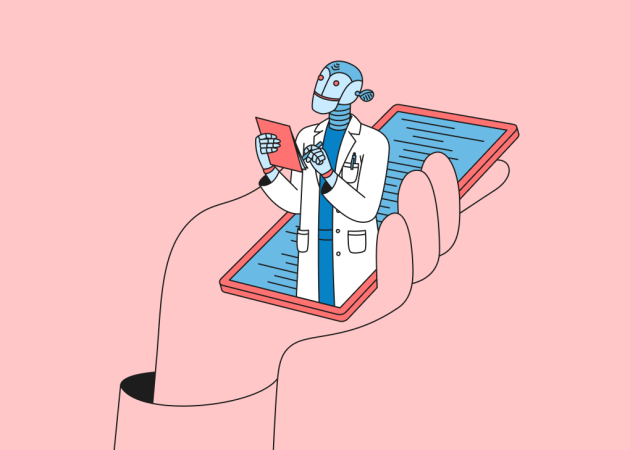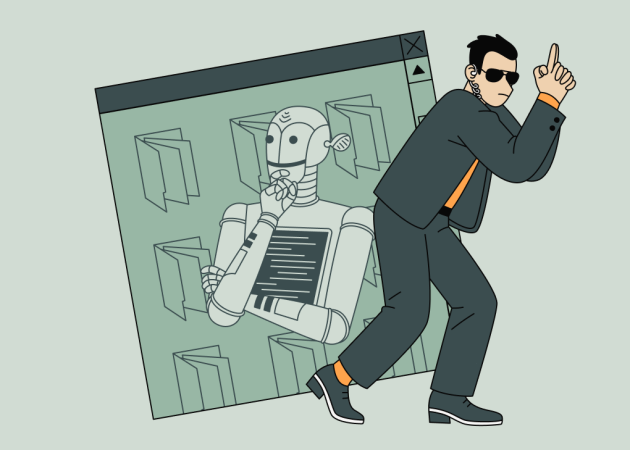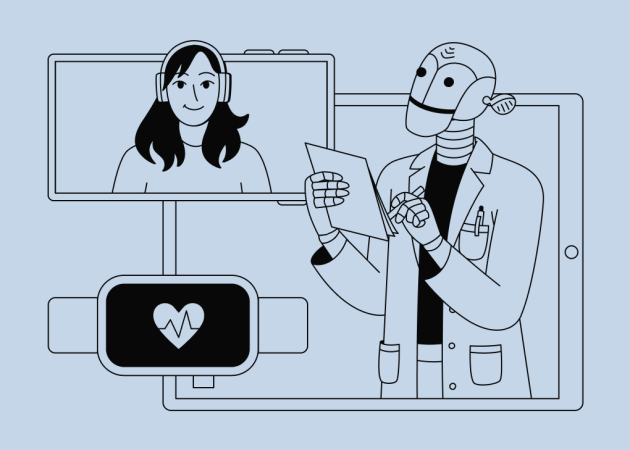
AI Agents in Healthcare: Key Use Cases, Challenges, and Future Prospects
Contents
Contents
Healthcare organizations are increasingly exploring custom AI agent development to address workforce shortages, administrative inefficiencies, and the growing demand for personalized care. These systems are moving beyond simple automation toward tools that can analyze data, assist clinicians, and support patients in real time.
In 2024, global funding into AI-focused digital health companies accounted for 42% of total annual digital health investment. This growth underscores how central AI agents have become to the future of care delivery. In this article, we’ll examine the most practical and high-impact use cases of AI agents in healthcare and the challenges developers face when bringing them to life.
Top Examples of AI Agents in Healthcare
The following AI agents in healthcare examples show how intelligent systems are already improving care delivery and efficiency. From symptom checking and chronic disease management to research support and mental health assistance, AI agents are becoming embedded in both clinical and administrative workflows. These use cases illustrate how AI enhances decision-making, streamlines operations, and makes healthcare more responsive to patients’ needs.
AI Agents in Healthcare: Intelligent Symptom Checking
AI-powered symptom checkers have evolved beyond basic decision trees. Today’s top AI agents in healthcare customer service use natural language processing and medical knowledge graphs to interpret user input, assess symptom patterns, and suggest next steps. They act as a first line of triage, guide patients toward appropriate care, and reduce the load on healthcare hotlines and clinics.
Unlike basic web symptom checkers, conversational AI agents can ask follow-up questions, understand context, and adjust based on a patient’s answers. This helps catch potential health issues earlier and gives people reliable guidance even when their doctor’s office is closed.
Typical capabilities include:
- Conversational symptom assessment using NLP and large medical datasets
- Risk stratification based on age, medical history, and reported symptoms
- Real-time recommendations for next actions (self-care, teleconsultation, or emergency care)
- Integration with telehealth platforms for follow-up or appointment booking
By collecting structured pre-visit data and highlighting potential risk factors, AI agents help doctors focus consultations and shorten diagnostic time. For patients, this means faster guidance and fewer unnecessary appointments.

Personalized Chronic Disease Management
Chronic conditions often require patients to make dozens of small health decisions each day, from adjusting medication timing to choosing the right meals. Medical AI agents can serve as long-term digital companions, analyzing personal health data and providing timely, contextually relevant guidance.
A patient with diabetes, for instance, might receive meal suggestions based on recent glucose readings or a prompt to walk after a long period of inactivity. The agent can also share summary reports with clinicians, creating a continuous feedback loop between patient behavior and medical oversight.
Behind the scenes, AI agents applications in healthcare aggregate data from wearables, medical devices, and electronic health records to detect risk trends before symptoms escalate. Predictive models can anticipate complications like hypertension spikes or respiratory distress, allowing for early intervention.
When working on the Eshmun Telenursing App, our team implemented a similar system, integrating real-time monitoring, caregiver communication tools, and compliance with healthcare standards like HIPAA and GDPR to support aging patients’ long-term health.
Automation of Administrative Tasks
A global shortage of at least ten million healthcare professionals is expected by 2030. As clinicians and nurses face increasing administrative pressure, AI agents in healthcare applications are becoming valuable partners in everyday work. They can take over time-consuming tasks, from patient intake to billing, while keeping information accurate and compliant.
By handling documentation, scheduling, and data entry, these systems free up healthcare practitioners to pay more attention to patients instead of dealing with paperwork. Below are some examples of AI agents in healthcare that help streamline administrative processes and make daily operations run more smoothly.
Documentation and Record Management
Clinical documentation is one of the most resource-intensive areas in healthcare. AI agents can automatically transcribe and summarize medical notes, extract key details from patient encounters, and populate electronic health records (EHRs) with structured data. This reduces physician burnout and improves data accuracy and regulatory compliance.
Patient Scheduling and Coordination
Intelligent scheduling assistants can book, reschedule, or cancel appointments, send personalized reminders, and coordinate follow-up visits. They can also balance physician availability, patient preferences, and resource utilization, minimizing no-shows and optimizing daily operations.
Billing, Claims, and Compliance
AI-driven systems can process insurance claims, verify patient eligibility, detect billing errors, and flag anomalies before submission. This speeds up reimbursement cycles and reduces costly human errors. Some agents can even ensure compliance with frameworks like HIPAA, GDPR, or PIPEDA through automated data handling and access logging.
Data Integration and Analytics
AI agents act as connectors between disparate healthcare systems. They extract and harmonize structured data from EHRs, labs, and IoT devices. AI agents make analytics pipelines more efficient and provide real-time dashboards for operational insights, staffing optimization, and population health management.
Automation increases efficiency and improves care continuity. When administrative data flows seamlessly across systems, clinicians gain a clearer picture of each patient’s journey and can act faster on critical insights.
Healthtech platforms that integrate AI agents into daily workflows demonstrate measurable gains in staff productivity and patient satisfaction. As healthcare organizations adapt to workforce shortages, automation stands out not as a cost-cutting measure but as a sustainability strategy, one that helps human professionals do what they do best: deliver quality care.
AI Agents in Healthcare Applications: Assisting in Drug Research
Developing a new medication can take over a decade and cost billions of dollars. AI agents help to speed up this process by finding potential treatments faster, improving clinical trials, and cutting costs along the way. They can analyze huge biomedical datasets, from genetic information to molecular interactions, much quicker than traditional methods, helping researchers spot promising compounds or even find new uses for existing drugs.
In early-stage discovery, AI agents in healthcare applications screen millions of molecules to predict which are most likely to bind effectively to a target protein. They can simulate reactions, filter out nonviable candidates, and recommend the most efficient synthesis pathways, all within hours instead of months.
Applications across the research lifecycle include:
- Target identification — Analyzing genetic and proteomic data to uncover potential disease mechanisms.
- Drug screening — Predicting molecular interactions and toxicity profiles using AI-driven simulations.
- Clinical trial optimization — Matching eligible participants, forecasting dropout risk, and refining trial design.
- Post-market monitoring — Detecting adverse drug reactions earlier through pattern recognition in clinical and real-world data.
By supporting pharmaceutical R&D teams, AI agents help translate raw scientific data into viable therapies, bringing treatments to patients faster and making the drug development process more adaptive and efficient.

Mental Health Support Chatbots
Limited access to mental health care continues to be a major challenge worldwide. Almost 1 in 10 people have mental disorders globally, and many lack access to timely or affordable care. AI-driven chatbots are helping bridge this gap by providing immediate, stigma-free emotional support and early intervention, especially where human therapists are unavailable or overloaded.
AI agents in healthcare applications don’t replace human therapists; they extend access to mental health resources by offering continuous, low-barrier interaction. When integrated with telepsychiatry or EHR systems, they can share anonymized insights that help clinicians better understand patient needs and progress.
Virtual Nursing and Patient Monitoring
AI agents in healthcare supply chains serve as continuous digital companions for patients and caregivers. These intelligent systems collect and analyze real-time data from wearables, connected devices, and mobile health apps to detect subtle changes in vital signs or behavior patterns. When potential issues arise, such as abnormal heart rate or skipped medication, they can instantly alert medical staff or family members.
In elderly and chronic care, virtual nursing assistants help maintain daily routines and reduce caregiver burden. They support medication adherence, provide gentle reminders, and offer basic guidance to patients between visits.
Our team assisted in developing a Telecare & Patient Monitoring Platform for a telecare provider that supports elderly patients living independently. The solution connects IoT devices to monitor daily health metrics and includes an SOS feature that notifies caregivers or emergency services when a patient feels unwell. By integrating AI-enabled monitoring and real-time data visualization, the system enables caregivers to respond faster and make more informed care decisions.
Challenges of AI Agent Development
Creating AI agents for healthcare involves much more than building algorithms or chat tools. These systems work in high-stakes settings where accuracy, privacy, and ethics matter just as much as innovation. Developers have to deal with strict regulations, scattered data sources, and the constant need to test and refine their models to earn clinicians’ trust. Below are some of the main technical, ethical, and practical challenges shaping AI agent development today.
Integration with Legacy Healthcare Systems (EHRs, PACS)
Integrating AI agents with legacy healthcare systems like EHRs and PACS is one of the toughest practical challenges in HealthTech. Many hospitals still operate on outdated or proprietary software that doesn’t communicate easily with modern platforms. This creates friction when AI solutions need to exchange data, trigger workflows, or provide real-time insights.
Common integration barriers include:
- Fragmented data formats — inconsistent or incomplete records across systems.
- Limited interoperability — lack of standardized APIs or HL7/FHIR support.
- Proprietary infrastructure — closed vendor ecosystems that resist external connections.
- Workflow misalignment — AI tools not fitting seamlessly into clinicians’ daily routines.
Overcoming these barriers requires not only technical interoperability but also organizational cooperation. Effective integration strategies align data governance, security, and workflow priorities so that AI agents can function as part of the broader healthcare ecosystem, not apart from it.
Ethical Concerns Around Autonomy and Decision-Making
AI agents in healthcare lead to ethical questions about autonomy, accountability, and the role of humans. When AI systems assist in clinical decisions, should the accountability for the outcome rest with the developer, the healthcare provider, or the system itself? Currently, this gray area stirs hesitation among both clinicians and regulators.
Key ethical concerns include:
- Overreliance on automation — clinicians may trust AI outputs without sufficient critical review.
- Opacity of algorithms — limited explainability can obscure how decisions are made.
- Bias and inequality — AI trained on unrepresentative data may disadvantage certain populations.
- Accountability gaps — unclear responsibility when automated recommendations cause harm.
Tackling these issues takes transparent model design, clear ethical guidelines, and strong human oversight. AI agents should always be tools that support, not replace, medical judgment, helping clinicians make better decisions while keeping trust and patient safety at the center of care.
Data Privacy and Patient Confidentiality
Protecting data privacy and patient confidentiality is a foundational challenge in developing AI agents for healthcare. Even anonymized datasets can sometimes be re-identified through advanced analytics, creating additional ethical and legal risks.
Core privacy challenges include:
- Secure data handling — ensuring encryption, controlled access, and end-to-end protection.
- Data sharing risks — transferring information across institutions or third-party services.
- Anonymization limits — difficulty maintaining privacy while preserving data utility.
- User consent and transparency — clearly communicating how data is collected and used.
The Future of AI Agents in HealthTech
AI agents are redefining healthcare by automating tasks, supporting clinical decision-making, and providing more personalized patient experiences. Ranging from chronic disease management to mental health support and research acceleration, they extend the reach of medical professionals and help make care more continuous, accessible, and data-driven.
As adoption grows, future success AI agent application in healthcare systems will depend on responsible development, balancing innovation with ethics, compliance, and human oversight. If you’re exploring how to adopt AI in your healthcare organization, get in touch to discuss how intelligent solutions can support your goals.
FAQs
Can AI agents replace doctors?
No, AI agents are not designed to replace doctors but to support them. They automate repetitive tasks, analyze large volumes of data, and provide preliminary insights that help clinicians make faster, more informed decisions. The most effective healthcare systems use AI to augment clinical expertise, not substitute it.
How do you ensure patient data privacy with AI?
Patient data privacy depends on robust security practices throughout model design and deployment. Healthcare organizations typically rely on encryption, anonymization, and secure data storage that comply with regulations like HIPAA or GDPR. Transparent governance, ongoing risk assessments, and alignment with ethical AI principles ensure that patient data used for AI training or inference remains confidential and traceable.
What is the difference between a medical chatbot and an AI agent?
A medical chatbot typically follows scripted interactions, like answering FAQs or routing users to resources while medical AI agents can reason, adapt, and act autonomously within defined boundaries. AI agents combine natural language understanding, predictive analytics, and integration capabilities to perform tasks such as symptom checking, scheduling, or patient monitoring. In short, chatbots converse, while AI agents analyze, decide, and execute, making them far more versatile in clinical and operational use cases.
Can AI agents integrate with existing hospital systems (EHRs, scheduling, etc.)?
Yes. Modern AI agents in healthcare use cases are designed to integrate with hospital systems such as electronic health records, scheduling tools, and telehealth platforms through APIs and interoperability standards like HL7 or FHIR. This integration allows seamless data exchange, enabling agents to retrieve patient histories, update records, or automate appointment coordination. When implemented securely, these integrations enhance continuity of care, reduce administrative overhead, and support data-driven clinical decision-making.
What are the limitations of current AI agents in healthcare?
AI agents in healthcare industry still face limitations in accuracy, contextual understanding, and ethical reasoning. Their recommendations depend on the quality and diversity of training data, which can have bias or gaps in rare conditions. They also require human oversight to validate outputs, especially in high-stakes clinical decisions. Such technical challenges as interoperability, explainability, and compliance further limit large-scale deployment. Ultimately, AI agents complement human expertise but cannot yet replace nuanced clinical judgment.
Subscribe to blog updates
Get the best new articles in your inbox. Get the lastest content first.
Recent articles from our magazine
Contact Us
Find out how we can help extend your tech team for sustainable growth.






